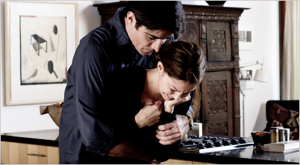Helen is the most accurate and moving portrayal of depression and its impact that you’re ever likely to see in a dramatic film. It may have slipped by you when released a few years ago since there was limited distribution. If you haven’t done so, see it now.
If you’ve been struggling with depression, you’ll recognize the truth in every scene – a viewing experience I often found hard to take but ultimately healing. If you need to understand more deeply what a friend or loved one is going through, this film will take you inside the illness. You might even recognize your own feelings in the reactions of those around Helen who are devastated by the loss of the person they used to know.
We follow the pain of a woman who is gradually losing control of the self she has been. She can’t take her life back because she’s reduced to reacting to the illness. That’s the helplessness that comes over you. You want to reassert control but can’t do it because all the energy you have goes into staying alive.
Helen, a brilliant music professor and pianist, slowly feels the illness taking over and tries to fight back. In a succession of torturing scenes, she tries to remain intimate with her husband, David, but recoils at his touch. She wants to hold onto her 13-year old daughter, but her repeated breakdowns frighten the girl away. She is determined to return to teaching, but in front of her class she can hardly speak. The students can’t stand it and walk out.
She keeps getting worse, tries to kill herself several times and can hardly say a word to anyone. She turns away from her baffled, angry husband and loses her job. During her first visit to a hospital for diagnosis, she reveals that she had gone through the same thing years a dozen years before, something she had never told her husband. That first episode had broken her marriage, and the second threatens to do the same. No one can get through to her.
There is one person, however, she can turn to. This is Mathilda, a gifted student of hers, a cellist, who is coming out of her own severe depression. The film centers on the relationship between these two. Mathilda offers the kind of support that can only come from someone who has shared this agony. She doesn’t have to ask how Helen feels because she already knows. She doesn’t pressure her to do anything more for her illness than she is doing because she understands how impossible it is for Helen to respond.
The story follows Helen’s painful and halting recovery but also brings out the terrible cost not only to her but to those who love her. Mathilda has relied on Helen for her own stability and begins a tragic descent when her friend is well enough to return to her family. Helen knows that she has to keep fighting to stay healthy. Her husband and daughter know that it’s not going to be easy to rebuild family life.
One of the remarkable things about this film is its rejection of the forced drama of most movie plots. There is no simple good-guy, bad-guy conflict, no subplot of infidelity, no sadistic mental hospital staff, no simple triumph and redemption. All the characters are real, responding to each other from their own points of view, experience, vulnerability and strength.
David, the husband, for example, has to regain his own balance amid his intense reactions. He holds onto his love for his wife even while living through the hurt and anger of rejection. It takes him a long time to accept emotionally what he hears from a doctor – Your wife is not unhappy, she’s ill. And the bitter advice of Helen’s ex-husband: Love has nothing to do with it. Something in him won’t give up, and he urges Helen to come home when she is better.
The depiction of Helen’s treatment especially interested me. It is all about hospitalization, white coats, medication and electroconvulsive therapy, with no mention of any alternatives. Still, it is not completely impersonal. The psychiatrist in charge of her treatment is genuinely concerned and frustrated at Helen’s frequent refusal to follow her advice.
That concern comes through even when the hospital – and the state – try to have her declared a danger to herself, giving them the power to hospitalize her against her will. They fail in their attempt, yet you share both Helen’s success in preserving her independence and the psychiatrist’s concern that Helen will try to kill herself again. And she does.
The film’s focus is not diverted from its careful depiction of the illness itself. Depression is the relentless, invisible force driving everyone in every scene. It’s a disaster that befalls a group of people, and we watch their struggle to comprehend it and figure out what to do. The unfolding of the illness and these human responses provide all the structure and plot this powerful drama needs.
The film deserves to be better known, though two hours on suicidal depression won’t satisfy most people’s idea of movie entertainment. I think it should be seen widely in the mental health community, at least.
You can get buy the DVD at Helen, or rent it from Netflix or Blockbuster. Here are the principal credits:
Helen: Ashley Judd
Mathilda: Lauren Lee Smith
David: Goren Visnjic
Julie (the daughter): Alexia Fast
Psychiatrist: Alberta Watson
Director: Sandra Nettlebeck


This movie……. I can’t stop crying……..
Does anyone know how to get the soundtrack!?
What a great review/analysis. My favorite scene in this movie is, when they shared five pieces of advice you get from people who have no idea what they’re talking about. “Take a vacation” is the such a maddening advice. It makes things worse.
Thank you for sharing! x